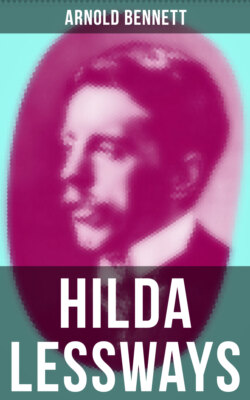Читать книгу HILDA LESSWAYS - Arnold Bennett - Страница 23
На сайте Литреса книга снята с продажи.
iii
ОглавлениеShe was happy, was Mrs. Lessways, in her domesticity. She foresaw an immediate future that would be tranquil. She was preparing herself to lean upon the reliability of Florrie as upon a cushion. She liked the little poppet. And she liked well-made tea and pure jelly. And she had settled the Calder Street problem; and incidentally Hilda was thereby placated. Why should she not be happy? She wished for nothing else. And she was not a woman to meet trouble half-way. One of her greatest qualities was that she did not unduly worry. (Hilda might say that she did not worry enough, letting things go.) In spite of her cold, she yielded with more gusto than usual to the meal, and even said that if Florrie ‘continued to shape’ they would have hot toast again. Hot toast had long since been dropped from the menu, as an item too troublesome. As a rule the meals were taken hurriedly and negligently, like a religious formality which has lost its meaning but which custom insists on.
Hilda could not but share her mother’s satisfaction. She could not entirely escape the soft influence of the tranquillity in which the household was newly bathed. The domestic existence of unmated women together, though it is full of secret exasperations, also has its hours of charm—a charm honied, perverse, and unique. Hilda felt the charm. But she was suddenly sad, and she again found pleasure in her sadness. She was sad because her adventure was over—over too soon and too easily. She thought, now, that really she would have preferred a catastrophe as the end of it. She had got what she desired; but she was no better off than she had been before the paralytic stroke of Mr. Skellorn. Domesticity had closed in on her once more. Her secret adventure had become sterile. Its risks were destroyed, and nothing could spring from it. Nevertheless it lived in her heart. After all it had been tremendous! And the virtue of audacious initiative was miraculous!... Yes, her mother was shrewd enough—that could not be denied—but she was not so shrewd as she imagined; for it had never occurred to her, and it never would occur to her, even in the absurdest dream—that the author of Mr. Cannon’s visit was the girl sitting opposite to her and delicately pecking at jelly!
“How is he Miss Gailey’s half-brother?” Hilda demanded half-way through the meal.
“Why! Mrs. Gailey—Sarah Gailey’s mother, that is—married a foreigner after her first husband died.”
“But Mr. Cannon isn’t a foreigner?”
“He’s half a foreigner. Look at his eyes. Surely you knew all about that, child!... No, it was before your time.”
Hilda then learnt that Mrs. Gailey had married a French modeller named Canonges, who had been brought over from Limoges (or some such sounding place) by Peels at Bursley, the great rivals of Mintons and of Copelands. And that in course of time the modeller had informally changed the name to Cannon, because no one in the Five Towns could pronounce the true name rightly. And that George Cannon, the son of the union, had been left early an orphan.
“How did he come to be a solicitor?” Hilda questioned eagerly.
“They say he isn’t really a solicitor,” said Mrs. Lessways. “That is, he hasn’t passed his examinations like. But I dare say he knows as much law as a lot of ’em, and more! And he has that Mr. Karkeek to cover him like. That’s what they say.... He used to be a lawyer’s clerk—at Toms and Scoles’s, I think it was. Then he left the district for a year or two—or it might be several. And then his lordship comes back all of a sudden, and sets up with Mr. Karkeek, just like that.”
“Can he talk French?”
“Who? Mr. Cannon? He can talk English! My word, he can that! Eh, he’s a ‘customer,’ he is—a regular’ customer’!”
Hilda, instead of being seated at the table, was away in far realms of romance.
The startling thought occurred to her:
“Of course, he’ll expect me to go and see him! He’s done what I asked him, and he’ll expect me to go and see him and talk it over. And I suppose I shall have to pay him something. I’d forgotten that, and I ought not to have forgotten it.”
